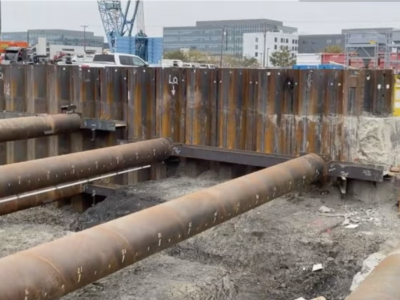
The UK government has given the green light for the controversial tunnel beneath Stonehenge.
Transport Secretary Mark Harper has awarded a Development Consent Order for the A303 Stonehenge project, which includes 12.9km of new dual carriageway containing a 3.2km tunnel.
Initially, National Highways’ proposals received approval in 2020 but, following a legal challenge over concerns about the environmental impact on the UNESCO World Heritage site, the decision was withdrawn by the High Court a year later.
The project intends to reduce the notorious congestion on the single-carriageway section of the A303 as it passes the ancient stones and to enhance journey times and reliability between the M3 and M5 motorways.
Nick Harris, National Highways chief executive, defined the A303 Stonehenge project as “part of the biggest investment in our road network for a generation”.
“The [government’s] decision follows a lot of work on a comprehensive year-long process to reassess our Development Consent Order, looking in detail at possible alternatives, also including cumulative carbon and heritage issues.”
He continued: “It means we’re now a step closer to solving the long-standing issues of congestion and delays on the existing A303, improving journeys for all our customers, and bringing much-needed relief to local communities.
“The investment, along with other improvements along the A303, will help to boost the south-west economy, improve journey reliability, remove the sight and sound of traffic from this very busy road, and return one of our most important World Heritage Sites to something like its original setting.”
The A303 Stonehenge advancement comprises:
- 12.8km of dual carriageway between Amesbury and Berwick Down;
- A tunnel at least 3.2km long under the World Heritage Site, closely following the current A303 route, despite a further 50m away from the Stonehenge monument, bypassing significant archaeological sites and intrusion on the view of the setting sun from the stones during the winter solstice;
- And a new bypass to the north of Winterbourne Stoke; and junctions with the A345 and A360 on either side of the World Heritage Site.
National Highways’ project director for the scheme, Derek Parody, declared the project sought to preserve and improve the World Heritage site, and this was being accomplished via collaboration with heritage groups, such as English Heritage, National Trust, Historic England, and the independent A303 Scientific Committee.
Parody expressed: “The scheme will not only sustain the Outstanding Universal Value of the Stonehenge landscape, it will also have a beneficial effect, and extensive archaeological studies and assessments have been undertaken to provide evidence of the benefits that the scheme will deliver for the World Heritage Site.
“The decision represents a major milestone, not only for us as the project team, but for all those who have supported this project over a number of years; our stakeholders, the heritage bodies, local and regional businesses and indeed local communities.”
Presently National Highways is investigating the detailed changes in the Development Consent Order and evaluating timescales. It expects to commence preparatory work next year.
There is now a six-week period in which parties can lodge an intention to challenge the decision legally, and in the meantime, National Highways will renew its plans to prepare for the project.
Last year the firm granted the main works contract to the More JV, incorporating FCC Construcción, WeBuild, and BeMo Tunnelling, to provide the £1.25bn (US$1.64bn) tunnel and primary construction work.
Mott MacDonald and Costain will be the company’s delivery assurance partners, delivering technical and construction management expertise by helping to mobilize the main works contractor, supervise construction, assist with the discharge of consent requirements, and secure the design.
The construction phase is planned to take five years to finish, and ahead of the main work, Wessex Archaeology will undertake archaeological mitigation work, whereas Octavius (formerly Osborne Ltd) will carry out preparatory work containing the reconfiguration of local authority roads.
Preliminary work and archaeological fieldwork will be done before the commencement of the primary construction phase.
















